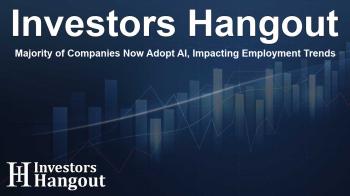Majority of Companies Now Adopt AI, Impacting Employment Trends

Major Shift in Employment Practices Regarding AI
A recent survey has unveiled that artificial intelligence (AI) is becoming an essential tool in the workplace, with many employers expecting their employees to engage with it actively. The findings, drawn from over 1,295 U.S. business leaders, reveal some striking trends in how companies are integrating AI into their operations.
AI Adoption Mandated Across Various Roles
According to the survey, 58% of companies now impose a requirement for employees to use AI tools. Shockingly, 10% of these businesses have reported that they terminate workers who resist this shift. Among the companies that mandate AI usage, 24% enforce this requirement across all roles, while 34% limit it to specific positions.
Reasons Behind the Emphasis on AI
Employers cite a multitude of reasons behind this trend. Key factors driving AI adoption include significant productivity gains, enhanced quality of work produced, and noteworthy innovations. Additionally, the push for AI tools is tied to the increasing need for businesses to remain competitive in an evolving market.
Strategies for Managing Resistance to AI
To address employee resistance towards AI, many companies are adopting a range of strategies. For example, 65% of firms respond by offering additional training or coaching sessions aimed at easing the transition into AI usage. However, others take a stricter approach: 36% of employers have reassigned employees to different roles, while 35% have limited promotion opportunities. Additionally, 32% of firms have reduced employee responsibilities, and a notable 10% resort to firing workers who refuse to comply with AI mandates.
Understanding Employee Concerns
Employers have found that there are common reasons for the resistance displayed by workers. Many express fears of job loss (52%) associated with AI tools, concerns regarding the accuracy of AI-generated results (52%), and discomfort towards adapting to new technologies (49%). Other prevalent issues include worries about data privacy, ethical considerations, and environmental impacts.
Addressing Concerns Through Training
A gap in comfort with AI tools is notably wider among older generations, with 35% of Baby Boomers and 31% of Gen X employees exhibiting reluctance, in stark contrast to just 8% of Gen Z workers. To bridge this gap, experts suggest that employers should enhance the training programs. These initiatives should not solely focus on traditional training but may also incorporate hands-on experiences, such as hackathons. Such activities allow employees to use AI tools in a low-pressure environment, ultimately building confidence and curiosity about their applications.
Creating Empowering Environments
Employers are encouraged to foster an empowering atmosphere that nurtures AI literacy among all employees, especially those who may feel intimidated by technology. Supportive environments can help transform AI from a source of anxiety into a valuable resource that enhances creativity and efficiency in the workplace.
Conclusion: The Future of Work in an AI-Driven World
The direction of workplace dynamics is clear: AI is here to stay, and its presence will only become stronger in the coming years. For employees, embracing AI as a tool will be crucial in navigating their careers. Those who can demonstrate proficiency and adaptability in using AI will likely find themselves in a more favorable position within their organizations.
Frequently Asked Questions
What percentage of companies now require AI usage?
58% of companies now mandate employees to use AI tools.
What are the common reasons for employee resistance to AI?
Employees often resist AI due to fears of job loss, concerns about AI's accuracy, and discomfort with new technologies.
What actions do employers take against employees who resist AI?
Employers may offer training, reassign roles, limit promotions, or even terminate those who refuse to comply.
How can companies support older employees in adopting AI?
Companies can provide hands-on training sessions, like hackathons, to help older employees get comfortable with AI.
What benefits do employers see from adopting AI?
Employers cite productivity gains, improved work quality, and increased innovation as key benefits of adopting AI.
About The Author
Contact Addison Perry privately here. Or send an email with ATTN: Addison Perry as the subject to contact@investorshangout.com.
About Investors Hangout
Investors Hangout is a leading online stock forum for financial discussion and learning, offering a wide range of free tools and resources. It draws in traders of all levels, who exchange market knowledge, investigate trading tactics, and keep an eye on industry developments in real time. Featuring financial articles, stock message boards, quotes, charts, company profiles, and live news updates. Through cooperative learning and a wealth of informational resources, it helps users from novices creating their first portfolios to experts honing their techniques. Join Investors Hangout today: https://investorshangout.com/
The content of this article is based on factual, publicly available information and does not represent legal, financial, or investment advice. Investors Hangout does not offer financial advice, and the author is not a licensed financial advisor. Consult a qualified advisor before making any financial or investment decisions based on this article. This article should not be considered advice to purchase, sell, or hold any securities or other investments. If any of the material provided here is inaccurate, please contact us for corrections.

